Class 4 Exam > Class 4 Notes > Science Olympiad Class 4 > Chapter Notes: Our Body
Our Body Chapter Notes | Science Olympiad Class 4 PDF Download
| Table of contents |

|
| Our Body |

|
| Systems of the Human Body |

|
| Nutrients and Their Functions |

|
| Sense Organs |

|
| Taking Care of Our Body |

|
Our Body
- The human body represents a marvel of nature, characterized by its intricate systems and organs functioning harmoniously.
- Each system within the body performs specific tasks contributing to the overall health and functionality of an individual.
- The concept of division of labor is evident in the human body, where different systems work collaboratively yet independently to ensure the body's optimal operation.
Systems of the Human Body
Digestive System
- This system is responsible for breaking down food into nutrients that can be absorbed by the body.
- It involves a series of organs including the mouth, esophagus, stomach, intestines, liver, and pancreas, each with its unique function in the digestion process.
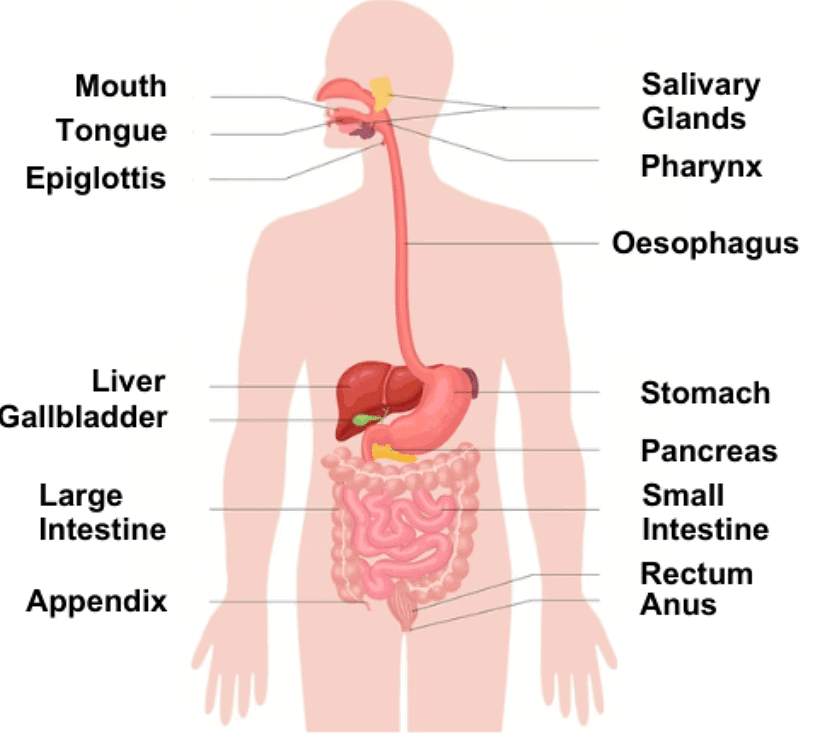 Digestive System
Digestive System
Circulatory System
- The circulatory system facilitates the transportation of oxygen, nutrients, and hormones to various cells and organs while removing metabolic waste products.
- It comprises the heart, blood vessels, and blood, working together to maintain circulation.
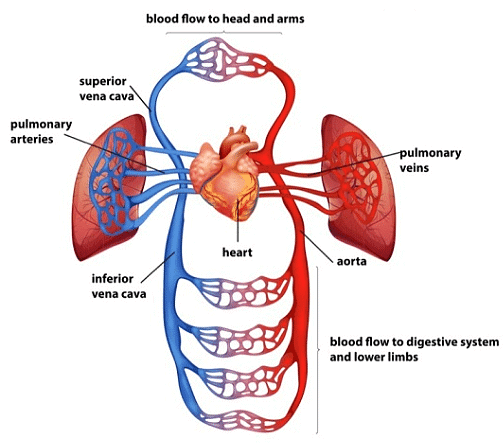 Circulatory System
Circulatory System
Respiratory System
- It is Vital for the exchange of oxygen and carbon dioxide between the body and the environment.
- The respiratory system includes the nose, trachea, bronchi, and lungs, where gas exchange occurs through breathing.
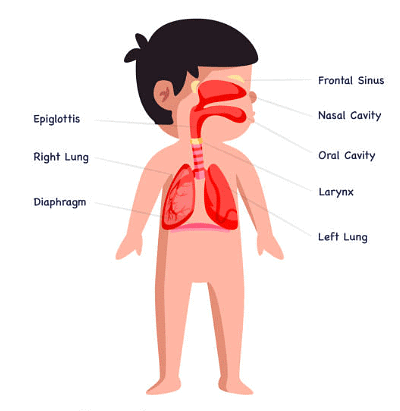 Respiratory System
Respiratory System
Excretory System
- It is Responsible for eliminating waste products from the body, including excess water and metabolic by-products.
- It consists of the kidneys, ureters, bladder, urethra, and skin, working collectively to maintain fluid and electrolyte balance.
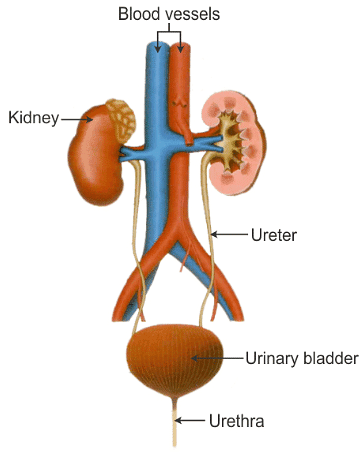 Excretory System
Excretory System
Nervous System
- The nervous system coordinates various bodily functions and transmits signals between different parts of the body.
- It comprises the brain, spinal cord, and nerves, facilitating sensory perception, motor control, and cognitive functions.
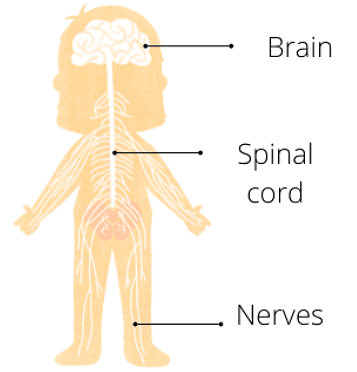 Nervous System
Nervous System
Reproductive System
- It is Essential for the continuation of the species, the reproductive system involves organs such as the ovaries, testes, and reproductive glands, responsible for the production of gametes and the process of reproduction.
Question for Chapter Notes: Our BodyTry yourself: Which system is responsible for breaking down food into nutrients that can be absorbed by the body?View Solution
Nutrients and Their Functions
- Carbohydrates: Serve as the primary source of energy for bodily functions, found in foods like bread, cereals, fruits, and vegetables.
- Proteins: Essential for tissue repair, growth, and maintenance, found in sources such as meat, fish, eggs, dairy products, and legumes.
- Fats: Provide concentrated energy storage and insulation, found in oils, butter, nuts, and fatty meats.
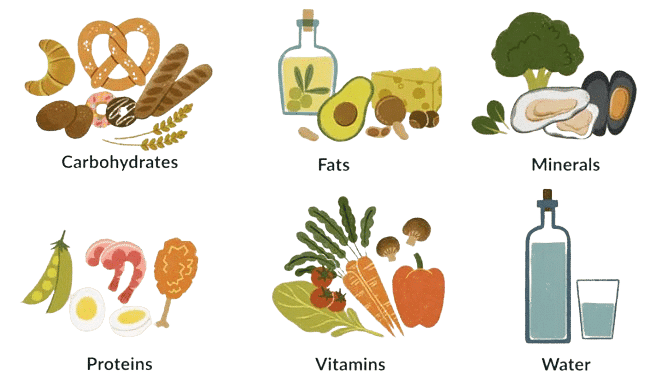 Nutrients
Nutrients - Vitamins and Minerals: Support various physiological processes and help maintain overall health, obtained from a diverse range of fruits, vegetables, dairy products, and fortified foods.
- Roughage and Water: Essential for proper digestion, roughage adds bulk to stool and aids in bowel movement, while water plays a crucial role in hydration, nutrient absorption, and waste elimination.
Question for Chapter Notes: Our Body
Try yourself:
What is the primary function of the circulatory system?View Solution
Sense Organs
- Eyes: Enable vision and perception of the surrounding environment, allowing individuals to interpret visual stimuli and navigate their surroundings effectively.
- Ears: Facilitate hearing and auditory perception, enabling individuals to detect and interpret sound waves for communication and environmental awareness.
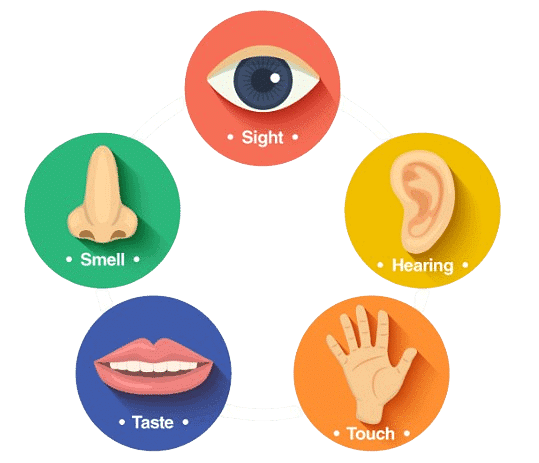 Sense Organs
Sense Organs - Nose: Responsible for olfactory sensation, allowing individuals to discern various odors and scents, contributing to taste perception and environmental awareness.
- Tongue: Functions in taste perception and gustatory sensation, enabling individuals to discern different flavors and textures of food, as well as aiding in speech articulation.
- Skin: Serves as the body's largest sensory organ, providing tactile sensation and temperature regulation, while also acting as a protective barrier against external pathogens and environmental hazards.
Taking Care of Our Body
Health and Hygiene
- Proper care and cleanliness prevent diseases and infections.
- Regular hygiene practices promote overall health and prevent the spread of germs.
Disease Prevention
- Taking care of our body reduces the risk of various infections and illnesses.
- Cleanliness of external organs prevents common health issues such as skin infections and respiratory problems.
Physical Appearance and Confidence
- Good personal hygiene enhances physical appearance and boosts confidence.
- Positive self-esteem contributes to better interactions with others.
Quality of Life
- A healthy body allows us to engage in daily activities and enjoy life fully.
- Maintaining health and hygiene practices prevents illnesses that may limit our participation in life's activities.
Key Practices for Body Care
- Hair, eye, ear, nose, mouth, hand, foot, skin, and private body parts care are essential.
- Regular washing, cleaning, and protection from harmful elements maintain overall hygiene.
The document Our Body Chapter Notes | Science Olympiad Class 4 is a part of the Class 4 Course Science Olympiad Class 4.
All you need of Class 4 at this link: Class 4
|
53 videos|70 docs|53 tests
|
FAQs on Our Body Chapter Notes - Science Olympiad Class 4
| 1. What are the main systems of the human body? |  |
Ans. The main systems of the human body include the nervous system, digestive system, respiratory system, circulatory system, skeletal system, muscular system, and more.
| 2. How do nutrients help in the functioning of our body? |  |
Ans. Nutrients provide the body with essential elements for growth, maintenance, and repair. They help in energy production, building and repairing tissues, regulating bodily functions, and supporting overall health.
| 3. What are the functions of sense organs in the human body? |  |
Ans. Sense organs like eyes, ears, nose, tongue, and skin help us to see, hear, smell, taste, and touch respectively. They play a crucial role in perceiving the world around us and responding to stimuli.
| 4. How does the digestive system work to break down nutrients? |  |
Ans. The digestive system breaks down food into smaller molecules through the process of digestion. Enzymes and acids in the stomach and intestines help in breaking down nutrients so that they can be absorbed by the body.
| 5. Why is it important to understand the functions of different body systems? |  |
Ans. Understanding the functions of different body systems helps us to take care of our health, prevent diseases, and make informed decisions about our lifestyle choices. It also helps in diagnosing and treating medical conditions effectively.
Related Searches














